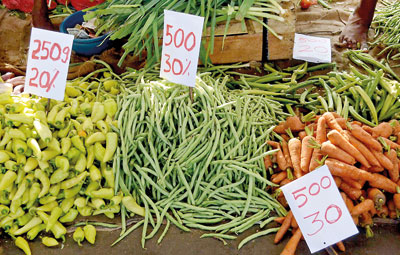Prices of vegetables have come down drastically, to consumers’ relief, while farmers have been hit by low prices.
According to a statistical officer at the Hector Kobbekaduwa Agrarian Research & Training Institute (HARTI), Ajith Ratnasiri, the prevalent favourable weather conditions for cultivation the supply of quality seeds to the farmers and the production in the Northern and Eastern areas contributing towards enhancing the national supply, have resulted in the surplus.
 |
| Destination garbage bins: Excess vegetables being thrown away at the Narahenpita Economic Centre.
Pix by Indika Handuwala and Susantha Liyanawatte |
 |
Mr. Ratnanasiri added that this issue has mainly occurred with crops that have a comparatively low production cost such as carrots, tomatoes and beans.
He further said to overcome over-cultivation and wastage, crop diversification among farmers should be practised, because, if all the farmers are engaged in the production of one crop, it will create an excess, resulting in the reduction of prices.
Farmers should also be advised to grow vegetables according to consumer needs, and there should be Government intervention in controlling the production. “Unless there are systematic solutions to manage the surplus in vegetables, the time spent on cultivation and the money spent on fertiliser will be a waste. Therefore, relevant authorities should come up with plans to either sell locally or export the surplus,” he said.
Head of Vegetable Division- Horticulture Crops Research & Development Institute, Dr. H.M. Ariyaratne also said that due to the increase in produce, the number of lorries supplying vegetables to the Dambulla market has doubled to 100 lorries per day.
Mr. Ariyaratne added that, export trade or value addition for vegetables like tomato, can be practised as solutions to address this issue. He further added that, over-cultivation and wastage could be minimised if Government authorities imposed regulations to control the amount of cultivation per season, by allowing farmers to cultivate on a certain fixed amount of land.
However, wholesale and retail dealers have varied opinions of the prevalent fluctuations in vegetable prices.
W.S.M. Gunathilaka (30), wholesaler cum retailer of vegetables, says that, prices of all vegetables have decreased, and all available varieties of vegetables were below Rs. 100 a Kg. He added that, due to the price decrease, this week sales increased by a fraction.
“Sales are bad these days, because you can get lower prices everywhere now. We get a crowd only on weekends. Only chillies and bitter gourd can be sold at higher prices. Approximately 150 kg of vegetables are thrown away every day, due to the drop in sales,” Mr. Kumara (45), a wholesaler cum retailer said.
Upul Samantha (43), another retailer, said that, due to the stocks not arriving on Poya Day, prices were relatively high on Thursday, but the overall prices have come down due to the glut of vegetables supplemented by the northern areas.
Within this dilemma, the bright side is seen only by the consumers, as they spend less money on vegetables. “We now buy more because the prices are low. It is good that, at least vegetables remain low priced, while all the other prices are hiking,” Mrs. Rathnayake (63), a housewife from Nawala said.
In Dambulla, over the weekend, some 40,000 kg of vegetables were thrown away, as farmers failed to find proper markets.
As a result, the flow of vegetables to the market was gradually reducing, with some of the farmers pointing out that it was not worth harvesting them, as transport cost was higher than their profits.
Farmers pointed out that the lack of interest in farming may push up prices by Sinhala New Year time.
They said that they may be forced to look at alternative crops, thereby showing less interest in cultivating vegetables in the future, which in turn would lead to vegetable price increases and possible shortages.
Too much of veggies,
too little consumption
By Kanchana Kumara
Ariyadasa
The Dambulla Economic Centre (DEC) has turned into a hub for the collection and distribution of vegetables across the country. Of the total requirement of vegetables in the country, around 70% come from the DEC.However, the sharp drop in vegetable prices has affected business at the DEC, with growing concern that the trend may continue. DEC manager C. Wijeratne said the drop in prices is because large scale cultivation of vegetables is taking place in the country.
“Many people are eating lentils (dhal), potato etc. And when there is a surplus of vegetables, we are forced to throw them away. People must be educated about the benefits of consuming vegetables,”he said.
|




